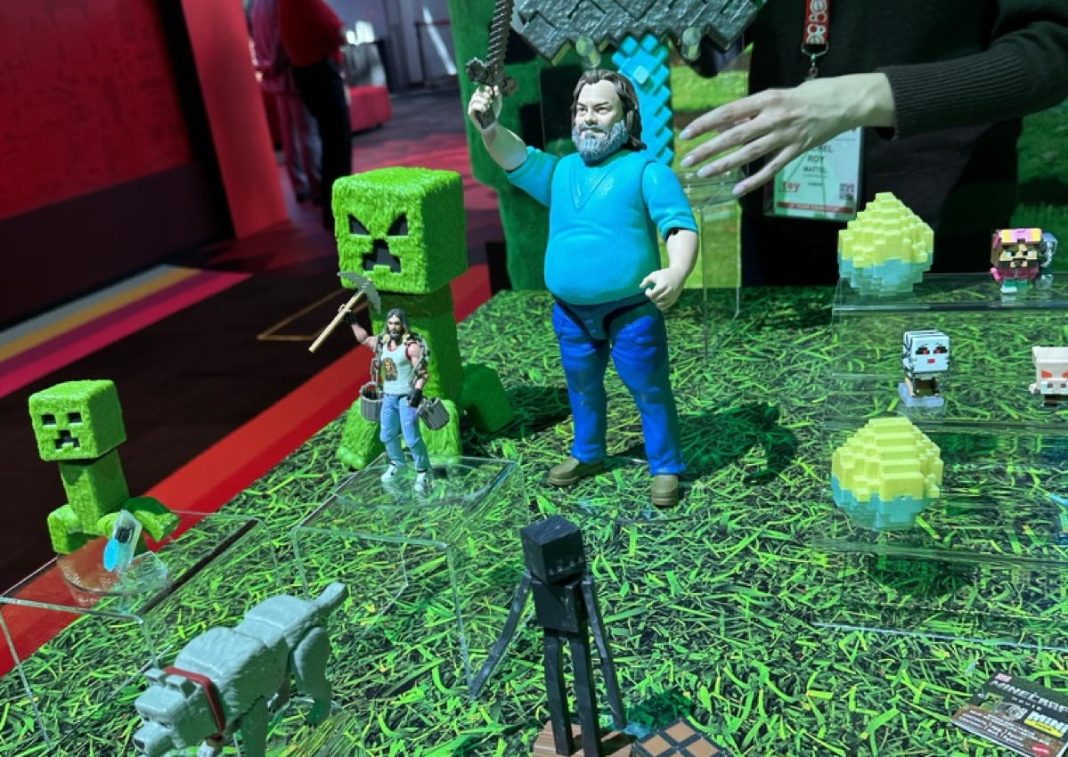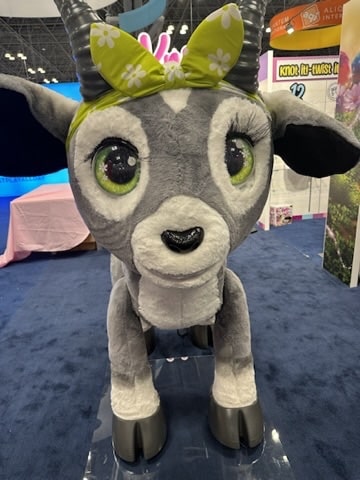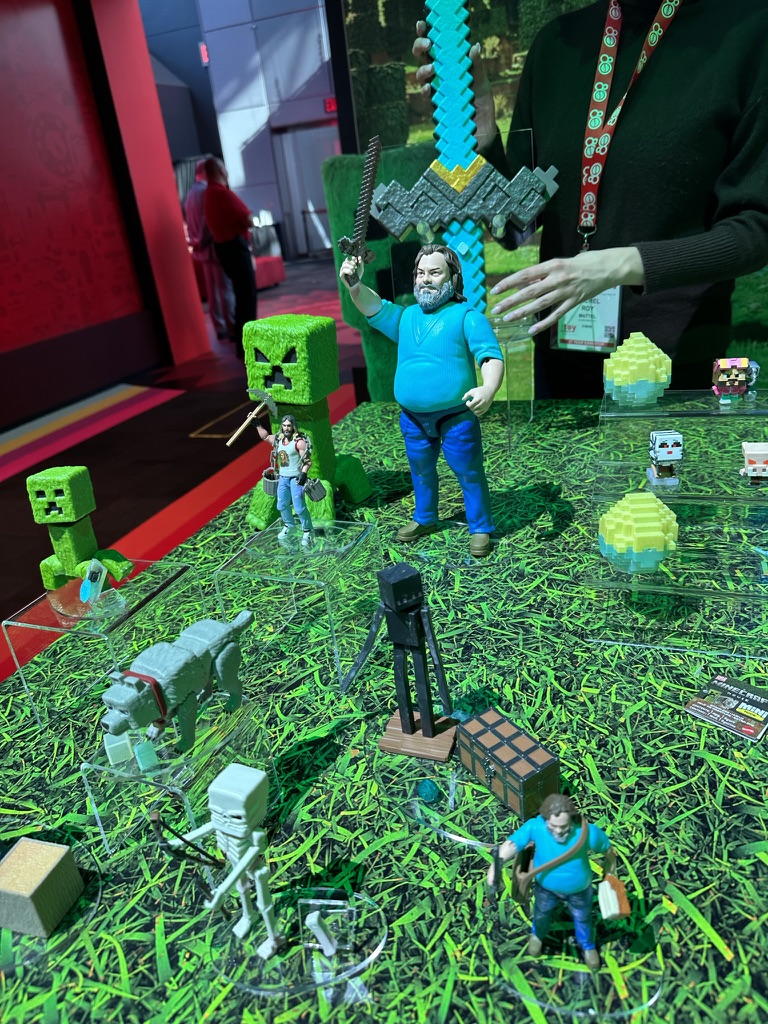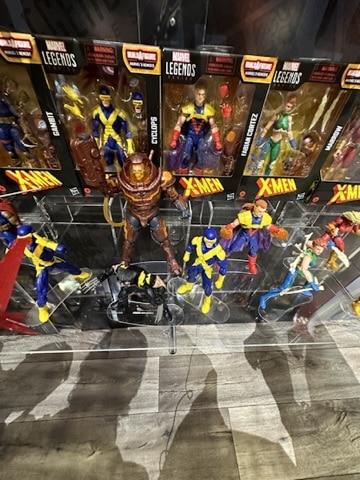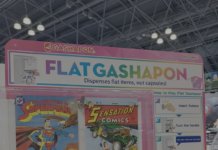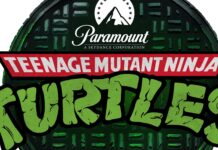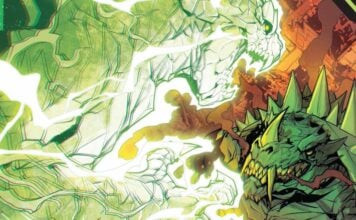UPDATE: As expected, both China and the US have put a 90 day hold on the tariffs, – however taht doesn’t change the uncertainty and turmoil that this article references.
Just a few weeks ago, the toy industry was a booming, thriving business with plans. Now thanks to the tariffs wars it looks its been hit by a category 5 hurricane.
Before we survey the wreckage, back to the comics. Gina Gagliano has a follow-up on how tariffs could affect the comics industry, and while printed matter has thus far mostly been spared, uncertainty is the order of the day.
“We didn’t expect how personal and politicized some of the rhetoric around these trade decisions would become,” Mad Cave Studios VP of Marketing Allison Pond and President Mark Irwin told me over email. “The framing of tariffs as a tool of cultural antagonism — against countries we’ve long considered global partners — has been disheartening. It feels like publishing and creative work are being caught in the crossfire of a much broader political game. We also didn’t expect just how fast the economic impact would trickle down. The ripple effects aren’t theoretical anymore — they’re showing up in print quotes, shipping delays, and tighter retailer orders.”
As bad as that is, toys are already being directly affected, and here’s a quick survey of how that industry is being struck – toys and games make up a significant portion of comics shops revenue, so this will have many wide ranging effects besides unhappy children.
The Toy Association, an industry organization, had a gloomy infographic on how US companies feel about the current 145% tariff on goods made in China: nearly half of toy companies large and small fear they will go out of business.
[embedpress_pdf]https://www.comicsbeat.com/wp-content/uploads/2025/05/tariff-survey-one-pager.pdf[/embedpress_pdf]
The Toy Association is also lobbying for toys to get an exemption, or else Christmas might actually be ruined. The importance of toys as aids for learning is being stressed.
The Toy Association is currently urging the U.S. government to grant an immediate reprieve from tariffs on toys imported from China, so that toys are available on retail shelves and available for the holiday season. Beyond this short-term need, The Toy Association is also advocating for a longer-term solution, urging U.S. leaders to secure “zero for zero” tariffs on toys through bilateral negotiations with trading partners.
“We respectfully request that the Administration protect childhood learning and development, with ‘zero for zero’ tariffs on toys as history and precedent support,” said Kathrin Belliveau, chief policy officer at The Toy Association. “We hope to work together to protect children and keep learning and play tariff-free.”
The toy plight has actually reached the ears of the President who called for all these tariffs, but he suggested that fewer toys are the answer:
“Well, maybe the children will have two dolls instead of 30 dolls.” He also suggested those two dolls could “cost a couple of bucks more than they would normally.”
While the use of the word “dolls” has been highlighted as a way to make the pressure on the toy industry a frivolous, childish issue, in 2022, the Toys & Games market generated a total revenue of US$122.90 billion, according to one report – so this is not chump change. Also, clearly, Donald Trump has never seen an action figure collection, which consists of significantly more than two dolls.
Mattel chair and CEO Ynon Kreiz has responded to the “Doll Wars” by stating that Mattel is unlikely to move production of their products to the US, and will instead “diversify production to other countries or just raise prices on U.S. consumers.” Mattel imports about 20 percent of their toys from China, and Kreiz hopes to lower that amount. Trump fired back with threats: “That’s ok. Let him go, and we’ll put a 100 percent tariff on his toy, and he won’t sell one toy in the United States, and that’s their biggest market.”
Meanwhile, Funko, maker of the once ubiquitous Pops, has been struggling for a while, and has also announced they’re looking at price increases, ICv2 has a grim report:
Funko disclosed a series of moves to deal with the impact of tariffs on its business with its quarterly report, including downsizing, shifting sources, and looking for capital.
…
Recent crisis management steps included pausing all outbound shipments from China, which the company is preparing to resume to some retailers soon, and accelerating the move of manufacturing from China to other Asian sources. The movement of manufacturing to other countries will have China as a source for only about 5% of U.S. shipments by the end of the year, down from about a third, CEO Cynthia Williams said in the conference call.
Although unrelated to tariffs, but most likely part of the cost cutting, Funko ahs also announced they are moving their “Funko Fundays” event from SDCC to their Hollywood store:
The annual celebration — long considered a cornerstone of the SDCC weekend experience for many — will now take place June 27–29 at the Funko Hollywood store, a few weeks ahead of Comic-Con. Funko confirmed that while Fundays is moving to L.A., Funko the company will still be at San Diego Comic-Con to exhibit.
Several stories about toys and tariffs spotlight individual companies: a US-owned Chinese toy factory is on life support:
But Huntar CEO Jason Cheung, 45, had already halted production at the 600,000-square-foot facility in Shaoguan. He saw the tariff for what it was: an existential threat to his company, which manufactures educational toys bound for the shelves of Walmart and Target, like Learning Resources Inc’s Numberblocks, which help teach kids math.
“I needed to start saving money as soon as possible,” Cheung said. In the four weeks since, he has cut production by 60% to 70%, laid off a third of the factory’s 400 Chinese workers, and reduced hours and wages to those still employed. Now, he’s pursuing a frantic, long-shot effort to move his operation to Vietnam before the company his dad founded 42 years ago runs out of money. He figures he has about a month. Huntar’s plight typifies a crisis facing countless factories in China, where about 80% of toys sold in the U.S. are manufactured, according to trade group The Toy Association. New orders have fallen sharply amid a brutal trade war with the United States that threatens to devastate the sector in both countries.
ICv2 also has an interview with Stephane Madi, CEO of Ravensburger, which makes a wide range of puzzles and games.
“For the remainder of 2025 (in the United States only), Ravensburger has decided to internalize and subsidize the tariff costs on our non-China-produced products. For our China-produced items, we will use a lower tariff rate estimate that will result in a 15% price increase on all China-made board and brain games and a 10% price increase on our China-made wooden railway products (effective June 1, 2025). While we may need to evaluate a new approach for 2026 based on market conditions, we are committed to data sharing, transparency, and the support of our industry.
Madi summed up the atmosphere of uncertainty and doubt:
The situation is obviously very fluid. Do you anticipate changing these plans if the tariffs on China, or on other countries, change?
Indeed, the situation is evolving and changing frequently. Our industry (and others) must re-invent themselves daily without clarity of what’s ahead. We stand with our industry and retailers during this disruptive time and commit to maintaining our focus on our company values – those of play and moments that truly matter. We hope for the best and are preparing for all scenarios with agility built in, to change as needed.
“Must re-invent themselves daily without clarity of what’s ahead” pretty much sums up the whole situation at this point. While China and the US are said to be hammering out a deal, the effects of this uncertainty could be felt for a long time.

